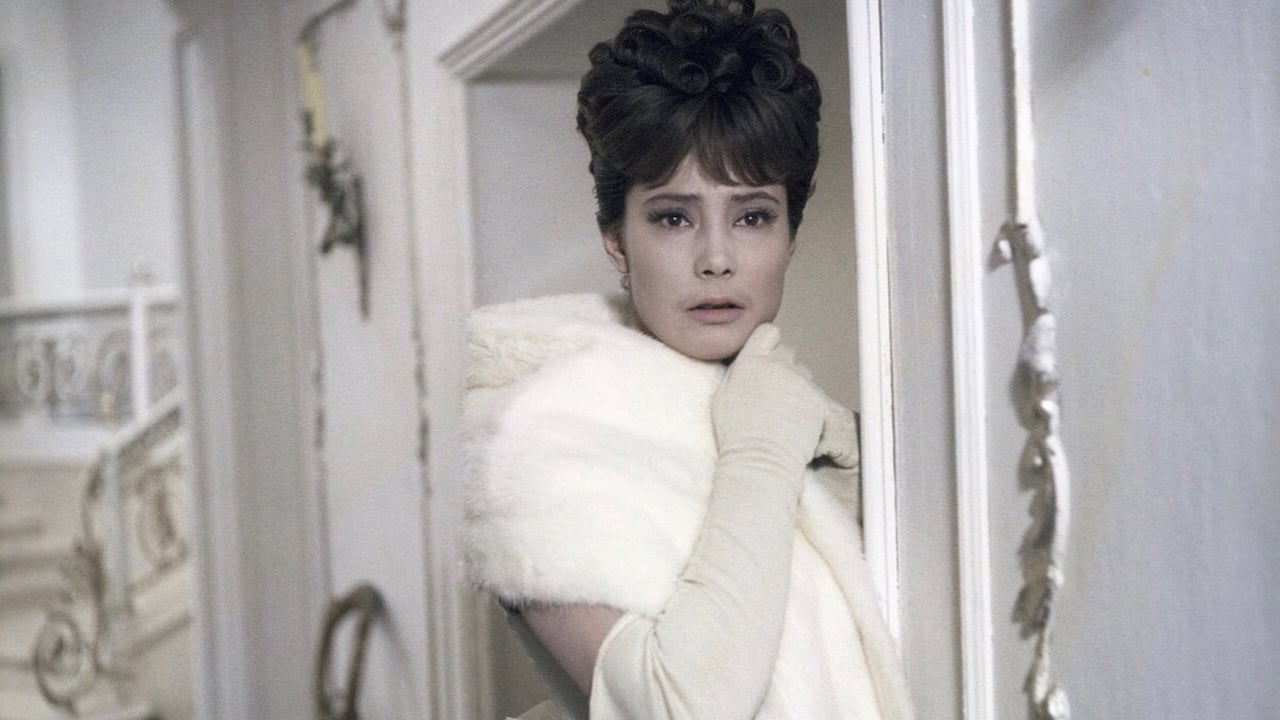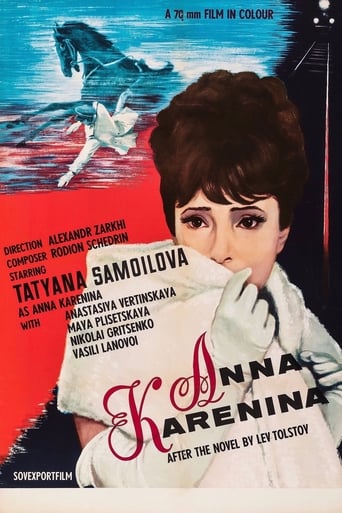Rijndri
Load of rubbish!!
Gurlyndrobb
While it doesn't offer any answers, it both thrills and makes you think.
Neive Bellamy
Excellent and certainly provocative... If nothing else, the film is a real conversation starter.
Portia Hilton
Blistering performances.
Kirpianuscus
for a part of its public, the best adaptation of the novel of Tolstoy. for me, one of good adaptation for the performance of Nikolai Gritsenko, who does a memorable Karenin and for Maya Plisetskaya. for few admirable scenes. for music. Tatyana Samoilova does a decent job. but she seems be prisoner of Veronika. and that fact becomes obvious scene by scene. she gives fragments from the image of Karenina. but the identification with the character seems be more than difficult. something missing. something impose to entire film to be out of psychology of her character. only her silhouette. sure, it is a beautiful film. but it is not the film of Samoilova. because she took , in real sense , the role in few scenes - first meeting with Vronsky, the dance with him, the dialogues with Karenin, the last meeting with Serioja. same situation for the too far by his character for Vasili Lanovoy. short, a beautiful adaptation. but its beauty is the only great virtue.
kashmirlayla
Whoever cast Tatyana Samojlova as Anna has some explaining to do. This film would be beautiful if it weren't for the star, who completely ruins every scene she's in. She is a terrible actress and her unattractiveness is a serious problem, as we are supposed to love Anna's grace and beauty. This is why her character is so tragic: this great beauty married to an old bore - we're supposed to understand why she follows her heart and goes for Vronsky, and even sort of root for her, believing she deserves her 'grand amour.' None of this comes through as you just hate Anna and her gigantic head. The film is ruined. Nepotistic casting at its most pernicious!
Aulic Exclusiva
This film re-creates the historical setting of the 1860s brilliantly, then spoils it all with an Eisensteinian-expressionistic style of acting and photography that gives one the giggles with its melodramatic jerkiness. Worst of all is Rodion Shchedrin's shrill, strident score. It would be too loud and insistent for an axe murder in an insane asylum; in a drawing room from the reign of Alexander II it sounds simply ludicrous and irritating.Vasili Lanovoy is handsome and romantic-looking as Count Aleksey Vronsky—his stiff bearing probably correct stylistically, his costumes wonderful. He does love to stare and lurch in that "I-am-Ivan-the-Terrible's-kid-brother" manner of Soviet film. His hair piece is not very good, either.Lanovoy does at least very much look his part, which is more than can be said of the woman playing Anna Karenina. She looks a lot more like Anna Magnani, complete with black moustache. Mme Karenin is supposed to be an extraordinary aristocratic beauty, a being from the highest society. Here she looks like she has strayed from a film by Pietro Germi. The actress likes bombastic reactions right out of Mexican television drama, which the camera captures with Shchedrinesque careenings.That great acting was possible, even in this school of film, is witnessed to by the master player of the role of Aleksey Karenin, Nikolai Gritsenko (1912–1979). He is quite unforgettable and detailed; he helps one understand Tolstoy better.Most of the film is the other way around: one would hardly understand anything if one had not previously read the novel. The abrupt and disconcerting editing doesn't help.No film could ever hope to do justice to such a literary masterpiece, but Clarence Brown's 1935 version is incomparably more satisfactory. Too bad. This could have been wonderful.
Diana Chavdarova
I must agree with 'iliawarlock' on Samoylova's performance - but even though this is undoubtedly the weakest link, the film doesn't hold on many stronger points. Samoylova, who is best suited to play Soviet peasant or worker, is only the emanation of the overall psychological flatness, ignorance and self-content, characteristic of many destroyer-of-classic-texts communist era films. Plisetskaya is brilliant, and Lanovoy is also delightful. An interesting fact is that, before a screening which took place in Sofia, Bulgaria, the still magnificent Vasiliy Lanovoy commented that his character Vronsky was incapable of the great love which Karenina had the gift for. From his performance, I got quite the opposite impression of a highly sensitive and devoted Vronsky - but thats the greatness of a complex text. Too bad we cannot witness a complex (if any) psychological interaction with Karenina in this dramatization.

